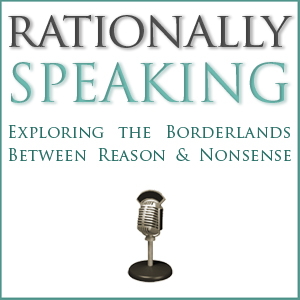Rationally Speaking #154 - Tom Griffiths on "Why your brain might be rational after all"
Rationally Speaking Podcast
New York City Skeptics
4.6 • 787 Ratings
🗓️ 6 March 2016
⏱️ 53 minutes
🧾️ Download transcript
Summary
Transcript
Click on a timestamp to play from that location
| 0:00.0 | Rationally Speaking is a presentation of New York City skeptics dedicated to promoting critical thinking, skeptical inquiry, and science education. |
| 0:22.5 | For more information, please visit us at NYCCEceptics.org. |
| 0:30.7 | Welcome to Rationally Speaking, the podcast where we explore the borderlands between reason and nonsense. |
| 0:40.8 | I'm your host, Julia Galef, and with me is today's guest, Professor Tom Griffith. |
| 0:45.2 | Tom is a professor in the University of California, Berkeley Psychology and Cognitive Science Department, |
| 0:51.3 | where he runs the computational cognitive science lab. |
| 0:55.0 | Tom's research focuses in large part on understanding how the human brain forms judgments and makes |
| 1:01.7 | decisions, and to what extent we can model those decision-making processes as following |
| 1:08.5 | sort of ideal statistical algorithms, the sort that we might program into, say, |
| 1:13.4 | an artificial intelligence. So that's going to be the topic of today's episode. Tom, welcome to the show. |
| 1:18.6 | Thank you. So to start off, maybe you could sort of give us a sense of why this is even a plausible |
| 1:24.7 | hypothesis. Why would we expect a priori that the human brain might be using statistical algorithms? |
| 1:30.3 | I think that's a good question. |
| 1:32.3 | So to me, a lot of it comes down to the fact that despite what we might read about our human failings, |
| 1:40.3 | human beings are still the best example that we have of a system that can solve a |
| 1:44.4 | variety of different kinds of problems. |
| 1:46.0 | You know, the problems that are the kinds of things that are at the cutting edge of AI |
| 1:51.0 | and machine learning research, things like learning languages, learning causal relationships, learning |
| 1:57.1 | from small amounts of data, being able to do things like science, which requires us to |
| 2:02.6 | engage with the world and then try and figure out the structure of that environment that we're in. |
| 2:06.6 | So I think, you know, for me, the key question is how is that we're capable of making those |
| 2:13.7 | kinds of inferences and then using rational models as a starting point gives us a kind of tools for engaging with those kinds of inferences, and then using rational models as a starting point, gives us a |
... |
Please login to see the full transcript.
Disclaimer: The podcast and artwork embedded on this page are from New York City Skeptics, and are the property of its owner and not affiliated with or endorsed by Tapesearch.
Generated transcripts are the property of New York City Skeptics and are distributed freely under the Fair Use doctrine. Transcripts generated by Tapesearch are not guaranteed to be accurate.
Copyright © Tapesearch 2025.

